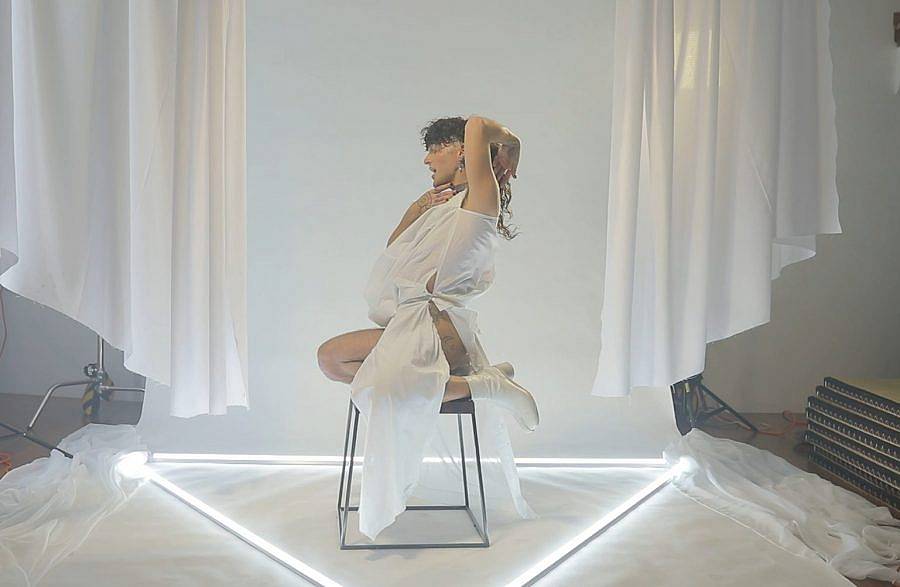Tell us a bit about yourself and what you do.
I usually try to keep myself spread pretty thin and to keep most of my creative bases covered, but for the most part, I focus on my work as a musician and performance artist.
How did you get started as a producer, performer, and musician?
I’ve been writing music since I could make noise on strings as a kid. I discovered the guitar and the piano to be incredible tools for songwriting as an early teen with a public school background in strings and classical training. Performance has always meant a lot more to me than just simply playing music, there’s a theater in it that I can’t really trace back to one root, but it’s been with me through thick and thin for as long as I can remember. Now as an adult, all those things seep through my roots and blossom through me in the form of pop-adjacent music, the songs are sorta the fruit on my tree now.
What does your studio space look like?
Lots of screens, lots of light, lots of books, a desk full of cables, a laptop full of midi files, most usually naked in it!
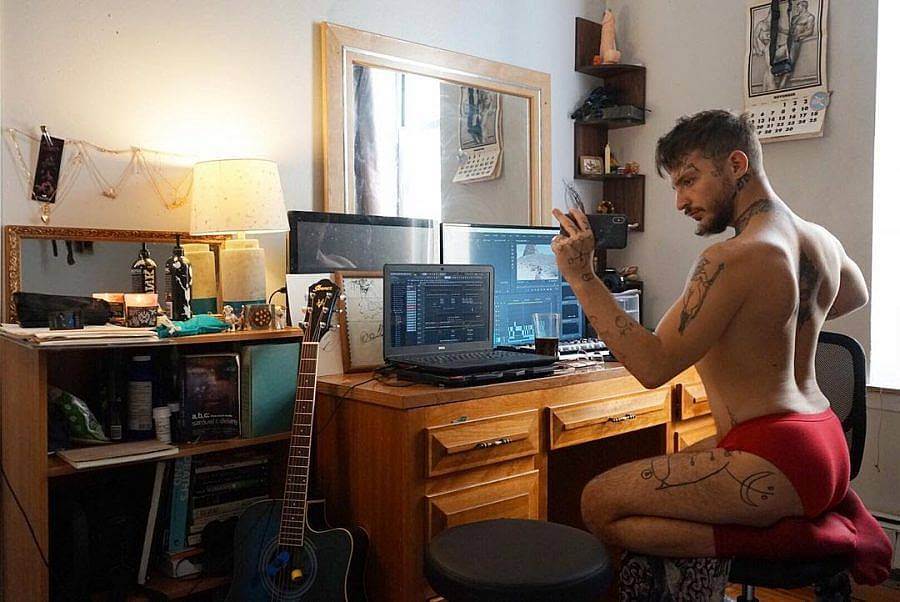
Your debut album follows a specific structure, starting on an introduction ending in a coda-like song “Again,” What was your approach for writing and composing the album?
My previous music project, SSTR, sorta just evaporated one day while I was writing its fourth EP. I wound up losing the hard drive filled with all of my work on that project, and the early composition of “An Introduction” was all I had backed up. So I felt it was fitting to include the last breath of my dead project as the first breath of my new one.
“Again” is certainly a kind of coda! In a way, the EP is an explanation of my heart and mind when working through a variety of experiences… you can think of it as an emotional roadmap, marking where in my 360 process I am with an internal issue.
During the time in my life that I was writing about (before I was sober and I dealt with a lot of things), I had a habit of pushing down difficult things through the same steps in a process, to regurgitate after “Again” repeating the lesson once more, harkening back to “An Introduction”.
From start to finish, Frankie is me trying to simultaneously explain my process to my audience while trying to understand it myself.
How does your performance practice interface with your music practice?
It usually goes hand in hand!
I’ve never been able to write music unless I’ve been performing it very often. A “win some, lose a lot” kind of mentality, I experiment with new material on eager audiences, small shows, DIY circuits, critical ears in an “artist-space” setting, residencies, etc. It goes without saying that this past year has been completely different, given that there were no shows at all. My writing style has turned inward and I’ve taken a LOT more time to sit and WORK on the music itself, so the quality of my songs has increased alongside the time and attention spent.
“A Mountain on Me” explores the weight of reckoning with various parts of one’s identity. Can you walk us through the song and the imagery created by its hook?
Nothing is as heavy as your own identity, especially when you walk back into a place that’s got a completely different point of reference for ‘you’ than you currently might.
The song was written when I went back to a place I’d left a long time ago, and hadn’t been back to since. I retreated there from the city at the beginning of the pandemic, and I was convinced that the stains I might’ve left there would haunt me still. I quickly learned that weight was my self-imposed nonsense. In reality, nobody thinks anything of you more than you think anything of yourself.
I learned that part of continuing life is encountering places you’ve been, getting to understand the person you were when you were there last, and come to terms with your growth… “…a call to the girls, a blanker slate than it’s ever been.”
Can you talk about the imagery featured in your new music video for your single “A Mountain on Me?”
I wanted a fun glam reel! I knew I had access to these incredible Vivienne Westwood dresses (kudos to @HouseWNYC for letting me dabble in the collection) so I wanted a reason to wear them. It’s that simple. The face, the hair, and the set were all things I was supposed to take on tour with me during summer 2020, so I needed a chance to finally use them.
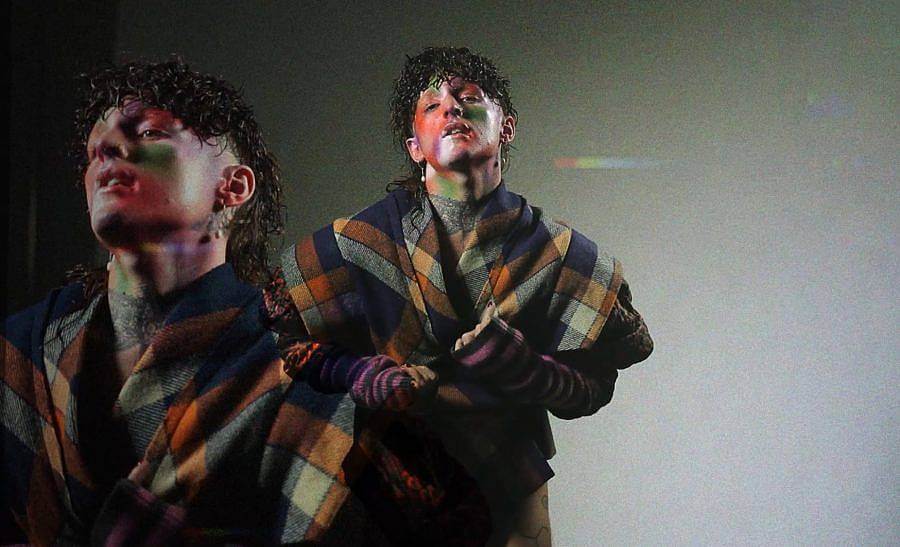
I’m sure you get these questions all the time, but I have to ask, can you talk about your artist name “Blew Velvet”, the history of the phrase, and what you mean to evoke by it?
People ask if it’s a Lynch thing all the time, but I promise you it’s a Bobby Vinton reference to me – eons before it’s a David Lynch reference.
I’ve gone by Blew since I was a teenager and chose the name on acid one night, I resented my birthname (Frankie) for the longest time, as a bastard who inherited their father’s name. It’s a completely self-centered vanity thing, I’m not trying to imply anything with it.
There is an ethereal and atmospheric quality to your visceral pop-oriented music. How would you describe your sound?
I think you did a good job of it just then! I think of it as pop-adjacent experimental electronic music. There’s no great way to talk about your own genre without sounding like you’re trying to convince somebody of something, so I usually just call it pop and wait for the conversation to unfold from there. Pop changes every day, and with creatures of the music world (the late, beautiful, SOPHIE as a great example) pumping out new sounds and experimenting in what they think “pop” is… the bar gets raised, or moved rather, to wherever the listeners and the creators are.
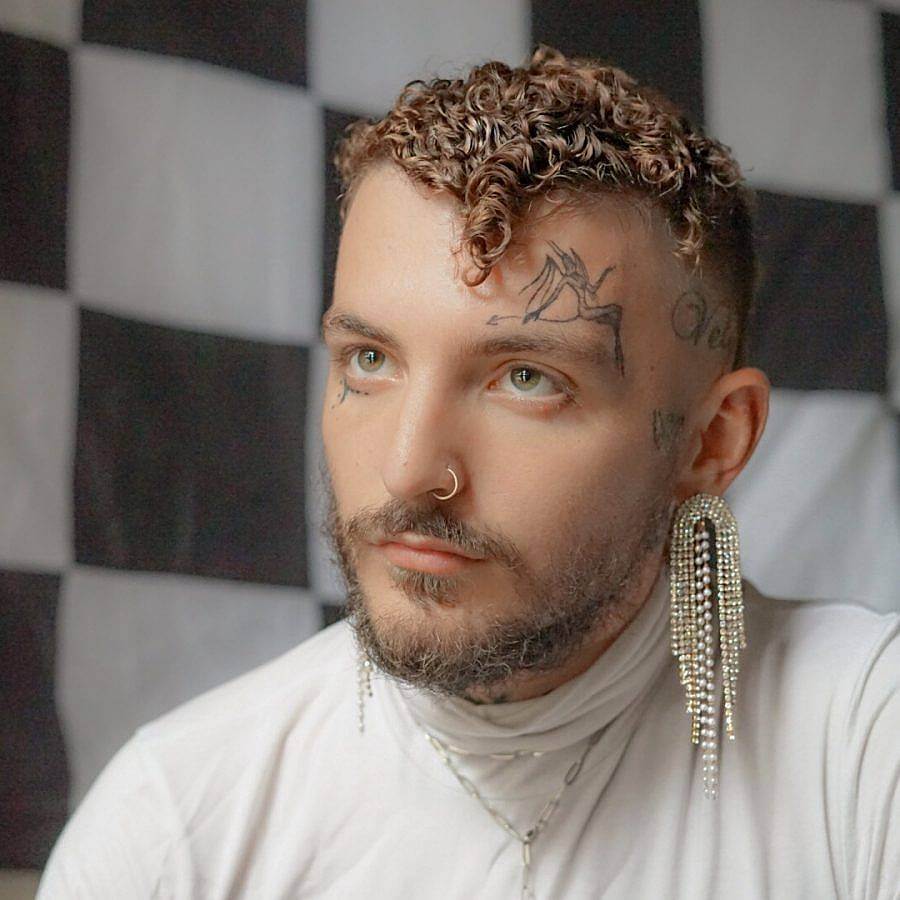
What are you listening to?
I have been listening to Moodoïd, Personaljjesus, Oliver Coates, Take That, Octo Octa, New Order, and a fucking ton of Italo disco classics and covers recently.
What musicians and creators are you influenced by?
I am constantly inspired by my direct peers, and people who have managed to push their uniqueness through with their musical work… dreamcrusher, Colin Self, Merlot, are three people off the top that all experiment within sorta specific genres, or at least listenerships; but in these genres, these three are examples of creators that not only somehow accentuate their musical uniqueness but also allow you to refine your tastes within those genres.
What do you hope people walk away feeling after listening to or dancing to your music?
I want people to relate. I want there to be something in the music or the lyrics that you can take a slice of with you and pull it out whenever you need. I want to be beloved by people in quiet, meaningful ways, the way I loved independent musicians when I was a kid- I used to be so greedy with my favorites! I hope somebody makes me their pocket favorite someday.
The pop world owes its legacy to queer musicians and creators. How does working as a queer artist impact your music practice?
It’s a double-edged sword for sure; I’m constantly swinging back and forth between feeling trapped by it and also so grateful for it. How do I just make music? I’m constantly asking if my music is queer because it strays from the norm or expands on a standard, or if it’s queer because I fuck dudes – and sometimes it’s hard to say! Granted that’s from the inside looking out, and I guess the conversation of queerness has changed so much so quickly.
To answer the question: it does “impact” my work I suppose, but only because my community, my resources, my friends, my support, all comes from queer people. Every drop of it is chosen family and hand-crafted connections with inspiring freaks and weirdos and sexual deviants, all trying to get our moments in the sun.
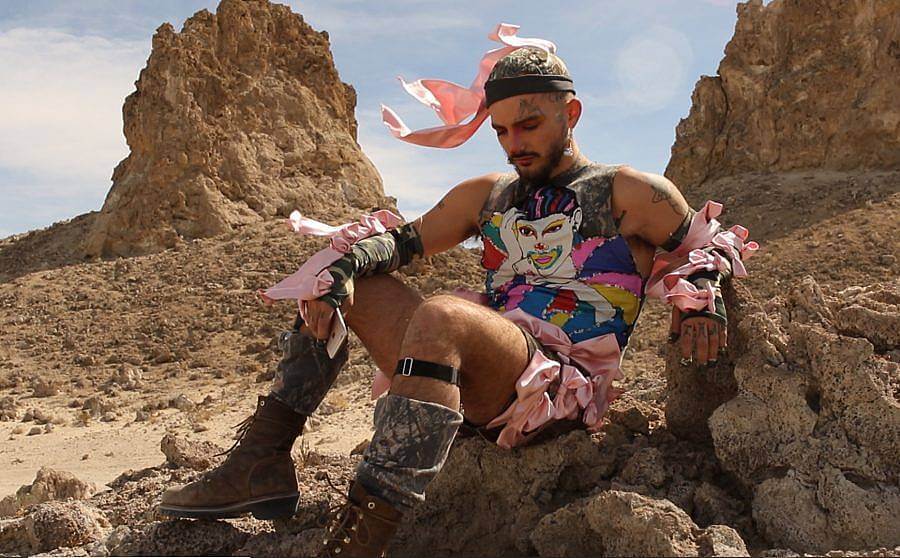
Any upcoming projects?
Yes! May 14th I have the next single and title track “Touch Me” coming out and its video. There’s gonna be one more single and video in June before the fuller EP comes out closer to the end of summer.
Interview composed and edited by Joan Carol (Amanda Roach).
